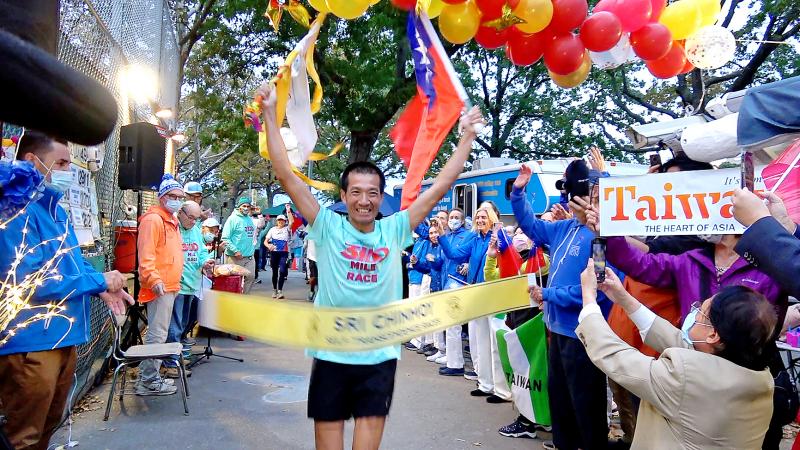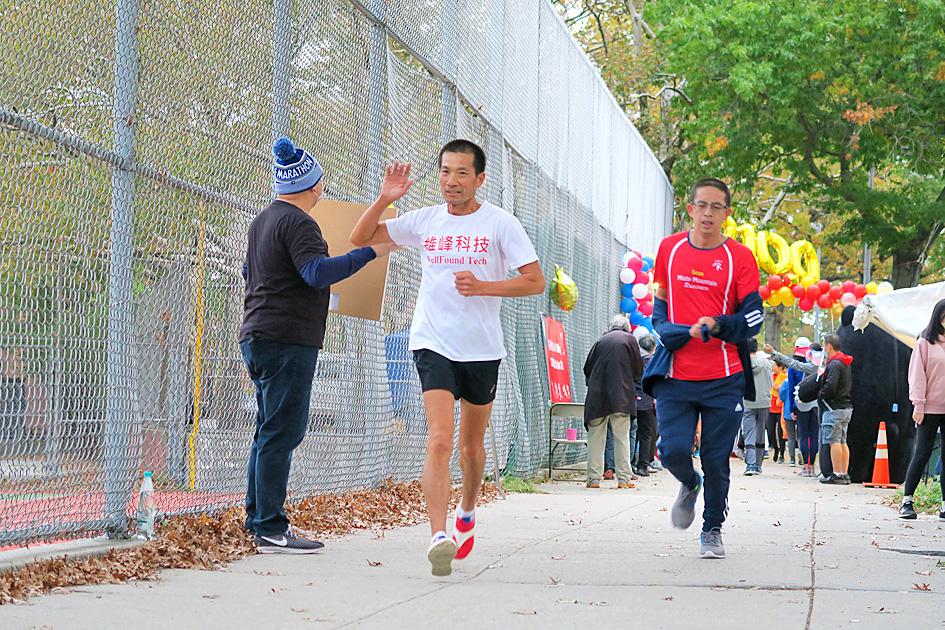Taiwanese ultramarathon runner Lo Wei-ming (羅維銘) on Saturday finished second among seven runners in a 4,989km road race in New York City, becoming the first Asian to have completed the challenge.
Holding the national flag and wearing sandals, Lo was cheered by the crowd as he passed the finish line of the 25th Annual Sri Chinmoy Self-Transcendence 3100 Mile Race, clocking 48 days, 11 hours, 52 minutes and 1 second.
“Wei-ming has been a real ambassador for the sport of super-long distance running, as well as for his Taiwan heritage and community,” the organizers said in their 48th daily online update for the event, which started on Sept. 5.

Photo: CNA
Lo finished behind Italy’s Andrea Marcato — who completed the race in 42 days, 17 hours, 38 minutes and 38 seconds, in his second win in a row at the event.
Lo’s time ranks 25th in the event’s annals.
Lo thanked his supporters and said that the key for finishing the race was the motto of “gratitude, peace, purity and discipline,” which he had learned from the event’s initiator, Indian spiritual leader Sri Chinmoy.

Photo: CNA
Lo said the biggest challenge for him was to face the unknown, but he had learned to maintain a peaceful state of mind.
Participants in what the organizers said is the longest road race in the world had to run laps for at least 95.9km every day at a high school in Queens
Runners could start every day at 6am and run until midnight, while taking breaks as needed was permitted, the organizers said.
Lo said that experienced ultramarathon runners can log 100km per day without problem, but doing so for 52 consecutive days is not easy.
It is important to stay disciplined and neither run too much nor too little every day, he said.
“I kept a high degree of discipline to manage my performance. I told myself when encountering extreme pain that ‘this was my choice and enjoy it,’” he said.

A strong continental cold air mass is to bring pollutants to Taiwan from tomorrow, the Ministry of Environment said today, as it issued an “orange” air quality alert for most of the country. All of Taiwan except for Hualien and Taitung counties is to be under an “orange” air quality alert tomorrow, indicating air quality that is unhealthy for sensitive groups. In China, areas from Shandong to Shanghai have been enveloped in haze since Saturday, the ministry said in a news release. Yesterday, hourly concentrations of PM2.5 in these areas ranged from 65 to 160 micrograms per cubic meter (mg/m³), and pollutants were

Taiwan’s armed forces have established response protocols for a wide range of sudden contingencies, including the “Wan Chun Plan” to protect the head of state, the Ministry of Defense (MND) said today. After US President Donald Trump on Saturday launched a series of airstrikes in Venezuela and kidnapped Venezuelan President Nicolas Maduro, concerns have been raised as to whether China would launch a similar “decapitation strike” on Taiwan. The armed forces regularly coordinate with relevant agencies and practice drills to ensure preparedness for a wide range of scenarios, Vice Minister of National Defense Hsu Szu-chien (徐斯儉) told reporters before a

EVA Airways on Saturday said that it had suspended a pilot and opened an investigation after he allegedly lost his temper and punched the first officer several times as their plane was taxiing before takeoff at Los Angeles International Airport. According to a report published on Thursday by The Reporter, the incident occurred after the flight’s Malaysian first officer tried to warn the Taiwanese pilot, surnamed Wen (文), that he was taxiing faster than the speed limit of 30 knots (55.6kph). After alerting the pilot several times without response, the first officer manually applied the brakes in accordance with standard operating

The New Taipei City Social Welfare Department on Thursday celebrated Paralympic competitor Chen Tzu-wei (張孜維), who received last year’s national Golden Eagle award for exemplary achievement by Taiwanese with disabilities. Chen, who suffers from childhood-onset muscular dystrophy, did not attend the first award ceremony held by the Ministry of Health and Welfare in November due to illness. Chen was formally presented with the award at the department, where he gave thanks to government workers for supporting his education and livelihood, the department said in a statement. Chen was raised by the Ai-hsin Home for Persons with Disabilities in the city’s Bali District (八里)